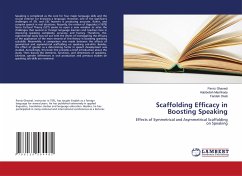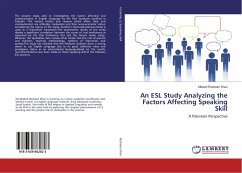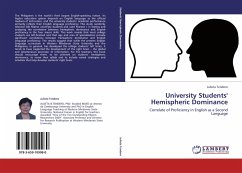
Scaffolding Efficacy in Boosting Speaking
Effects of Symmetrical and Asymmetrical Scaffolding on Speaking
Versandkostenfrei!
Versandfertig in 6-10 Tagen
33,99 €
inkl. MwSt.

PAYBACK Punkte
17 °P sammeln!
Speaking is considered as the core for four major language skills and the crucial criterion for knowing a language. However, one of the significant challenges of EFL and ESL learners is producing accurate, fluent, and complex speech in real situations. Recently, the notion of Vygotsky's (1978) Socio Cultural Theory (SCT) seems to open a new window to solve the challenges that second or foreign language learners and teachers face in improving speaking complexity, accuracy, and fluency. Therefore, this experimental study was set out with the intent of investigating the efficacy of the applicatio...
Speaking is considered as the core for four major language skills and the crucial criterion for knowing a language. However, one of the significant challenges of EFL and ESL learners is producing accurate, fluent, and complex speech in real situations. Recently, the notion of Vygotsky's (1978) Socio Cultural Theory (SCT) seems to open a new window to solve the challenges that second or foreign language learners and teachers face in improving speaking complexity, accuracy, and fluency. Therefore, this experimental study was set out with the intent of investigating the efficacy of the application of the main tenants of this theory in boosting speaking sub-skills. Meanwhile, a comparison was made between the effects of symmetrical and asymmetrical scaffolding on speaking sub-skills. Besides, the effect of gender as a determining factor in speech development was studied. Accordingly, this book first provides a brief introduction about the study. Then discuss the elements, functions, and dimensions of speaking. Likewise, gender differences in oral production and previous studies on speaking sub-skills are reviewed.












